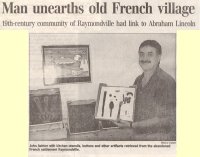Man unearths
old French village
Saturday, July 20, 2002
19th-century
community of Raymondville had link to Abraham Lincoln
By Monica Graham
– Bridgeville
|

(Click on image to see larger picture) |
Photo caption: John
Ashton with kitchen utensils, buttons and other artifacts retrieved
from the abandoned French settlement Raymondville.
|
A Pictou County man’s curiosity about a cluster of French names
recorded in an old atlas among the Macs, Frasers, Camerons and other
Scottish settlers has led him to the remains of a 19-th century French
community south of New Glasgow.
“It’s out in the middle of nowhere,” said Bridgeville graphic
artist John Ashton.
While researching Raymond-ville,
Mr. Ashton undercovered tales of economic hardship, political and
corporate intrigue, religious riots and even a connection to American
president Abraham Lincoln.
Raymondville was founded in 1877 just north of the confluence of the
Pictou, Colchester, Guysborough and Halifax County lines. It was
named for the first baby born there.
Within three years, most of its 11 families had dispersed across the
continent, leaving behind six graves in a tiny cemetery, a few
foundations and discarded household items, and little else.
Only one family, the Bonnets, remained until finally leaving in 1942.
Mr. Ashton got hooked on the community when, armed with a compass and
map, he tramped around the area until he stumbled over a stone
foundation. Hooked on the quest, he asked local residents about
the site and heard vague reports of French families visiting the
community of Lorne, Pictou County for supplies in the early 1900’s,
and then of a teacher who had recorded information while studying at
Universite Sainte Anne in Pointe de l’Eglise, Digby County.
A search of old newspapers and church records at the provincial
archives proved to be a gold mine of information, leading Mr. Ashton
to more archives in France, Kansas and Toronto.
His research revealed that a scarcity of skilled miners in the early
1870’s prompted Canadian businessman Sir Hugh Allan to recruit
miners in Prussian-occupied France for Pictou County’s coalfields.
At first the French were steadily employed here but soon American coal
tariffs and subsequent reduced production led to layoffs and labour
unrest.
The destitute French miners fell in with a Presbyterian mission headed
by a former Roman Catholic priest, Frther Charles Chiniqui, and were
converted to Protestantism.
Chiniqui was a controversial evangelist whose sermons led to riots in
Antigonish and Halifax.
Sued by
the Chicago diocese in the 1850’s, Chiniqui hired Illinois lawyer
Abraham Lincoln to successfully defend him and they remained friends
until Lincoln’s assassination.
Under
the mission’s leadership, 15 French families applied for a Nova
Scotia land grant in 1877, and Raymondville, also known as the French
Mission, was born.
“It
would have been good farmland,” Mr. Ashton said…. But they were
miners.”
Likely
overwhelmed by the hardship and isolation, the community failed.
Although
some descendants remain in the area, the original surnames- Homme,
Segretin, Bonnet, Floret, Durand, Mazzee, Passieux and Oudin – have
mostly disappeared, Mr. Ashton said.
He as traced other descendants to Pennsylvania coal towns and to
another Presbyterian mission in Kansas.
Mr. Ashton plans to organize his findings into a book in time for the
2004 Acadian Congress, but admits there’s no personal connection to
Raymondville.
“It’s just a Love of history.”